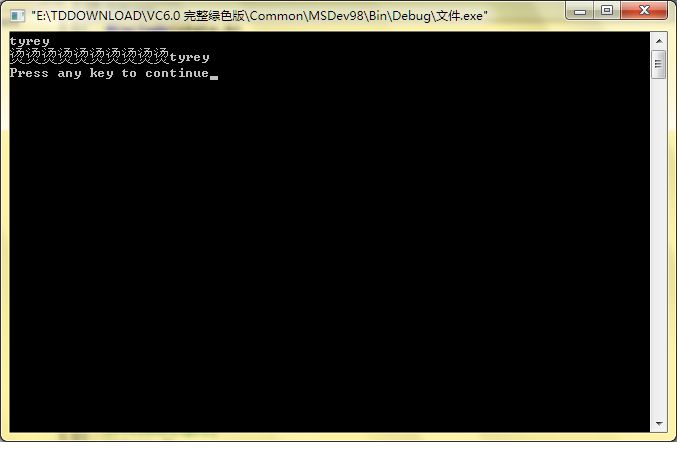C语言文件问题:为啥下面程序会有乱码输出?
Posted
tags:
篇首语:本文由小常识网(cha138.com)小编为大家整理,主要介绍了C语言文件问题:为啥下面程序会有乱码输出?相关的知识,希望对你有一定的参考价值。
#include<stdio.h>
#include<stdlib.h>
#include<string.h>
int main()
FILE *fp1;
char s[20],str[20];
char fileout[10]="as.dat",filein[10]="bs.dat";
if((fp1=fopen(fileout,"wb"))==NULL)
printf("打开输出文件出错!\n");
exit(0);
scanf("%s",s);
fputs(s,fp1);
if((fp1=fopen(fileout,"rb"))==NULL)
printf("打开输入文件错误!\n");
exit(0);
while(!feof(fp1))
fgets(str,20,fp1);
//str[strlen(s)+1]='\0';
printf("%s\n",str);
fclose(fp1);
return 0;
图片以上传,请各位专家帮我看看,拜托了!

struct apparatus_info //定义仪器设备信息结构体
char number[10]; //设备编号
char name[20]; //设备名称
double price; //设备单价
char inDate[20]; //购进的时间
char producter[20]; //生产厂家
int count; //购进的数量
char usability[INITIAL_SIZE]; //设备的可用性
;
问题有好几处,也有几种方法解决
1,
分配给records[numApps]的内存空间虽然是给它使用
但是它没有初始化,里面是有一堆乱七八糟的数据
之后你保存到records[numApps]里的数据
如果没有用完numApps空间
尾巴还是有一堆乱七八糟的数据
所以不干净
如果records[numApps]是字符串
搬进去住前先把房间打扫一下,用
memset(records,0,numApps);
就是让它的存储空间全部写0
但是你的records[numApps]是结构体数组
所以需要另外保证每组数据的每个成员都有写值
2,
你用的是gets(str);
输入的是字符串,回车结束
str是10,而records得成员有10,20,这就有隐患
3,
atof和atoi函数使用的时候要小心
对于atoi和atof,
有新的函数可以替代
atoi可以用strtol替代,
而atof可以用strtod等替代
strtol比atoi安全,
records[numApps].price=(float)atof(str);
改成
records[numApps].price=(double)atof(str);
4,
输入records[numApps]成员数据的时候不如用
scanf("%d%f%s",&......);
格式化输入安全
5,
fp=fopen("app_info.txt","w");
是以文本方式写入文件的
fwrite(&records[i],sizeof(AppInfo),1,fp);
验证app_info.txt是文本还是二进制
fwrite的第一个参数是字符串,是文本
fwrite的第一个参数是int或float,是二进制
你的参数是结构体,数据类型复杂,app_info.txt是二进制
具体情况要具体分析
还有fwrite输出结构体数组数据,一句话多痛快
但是你要阅读,或者用程序读出来的时候你会感觉登山一样难
所以用fprintf格式化输出安全
for(i=0;i<numApps;i++)
fprintf(fp,"=============================\n");
fprintf(fp,"%s\n",&records[i].number);
fprintf(fp,"%s\n",&records[i].name);
fprintf(fp,"%f\n",&records[i].price);
fprintf(fp,"%s\n",&records[i].inDate);
fprintf(fp,"%s\n",&records[i].producter);
fprintf(fp,"%d\n",&records[i].count);
fprintf(fp,"%s\n",&records[i].usability);
6,
真要用fwrite
建议如下
char outbuf[max_buf]; //max_buf=1000或更大,保证够用
char tempbuf[20];
memset(outbuf,0,max_buf);
for(i=0;i<numApps;i++)
sprintf(tempbuf,"%s\n",&records[i].number);
strcat(outbuf,tempbuf);
sprintf(tempbuf,"%s\n",&records[i].name);
strcat(outbuf,tempbuf);
sprintf(tempbuf,"%f\n",records[i].price);
strcat(outbuf,tempbuf);
sprintf(tempbuf,"%s\n",&records[i].inDate);
strcat(outbuf,tempbuf);
sprintf(tempbuf,"%s\n",&records[i].producter);
strcat(outbuf,tempbuf);
sprintf(tempbuf,"%d\n",records[i].count);
strcat(outbuf,tempbuf);
sprintf(tempbuf,"%s\n",&records[i].usability);
strcat(outbuf,tempbuf);
if(fwrite(outbuf,strlen(outbuf),1,fp)!=1)
printf("写入错误!\n");
看,还是要格式化输出tempbuf,outbuf过渡一下
让fwrite写的是字符串
7,
输出前可以用下面printf显示来看看
学会debug
for(i=0;i<numApps;i++)
printf("%s\n",&records[i].number);
printf("%s\n",&records[i].name);
printf("%f\n",records[i].price);
printf("%s\n",&records[i].inDate);
printf("%s\n",&records[i].producter);
printf("%d\n",records[i].count);
printf("%s\n",&records[i].usability);
参考技术A 真是大哥,我告诉你为什么
因为我也遇到过
你用fprintf和fscanf语句进行文件的读取和存储,绝对不会出现这种问题的!!!追问
你可以告诉我这是为什么吗?
追答用我老师的话说就是
fputs和fgets是一种不完善的输入输出流
我们现在一般都采用fprint和fscanf进行文件的输入输出了
#include<stdlib.h>
#include<string.h>
int main()
FILE *fp1;
char s[20] = "\0",str[20] ="\0";
char fileout[10]="as.dat",filein[10]="bs.dat";
if((fp1=fopen(fileout,"wb"))==NULL)
printf("打开输出文件出错!\n");
exit(0);
scanf("%s",s);
fputs(s,fp1);
if((fp1=fopen(fileout,"rb"))==NULL)
printf("打开输入文件错误!\n");
exit(0);
while(!feof(fp1))
fgets(str,20,fp1);
//str[strlen(s)+1]='\0';
printf("%s\n",str);
fclose(fp1);
return 0;
在使用局部数组对象的时候 ,记得要初始化才能使用。 我编译了下,然后看了下.bat文件数据都对的。 参考技术C scanf("%s",s);
改为scanf("%s",&s);
以上是关于C语言文件问题:为啥下面程序会有乱码输出?的主要内容,如果未能解决你的问题,请参考以下文章